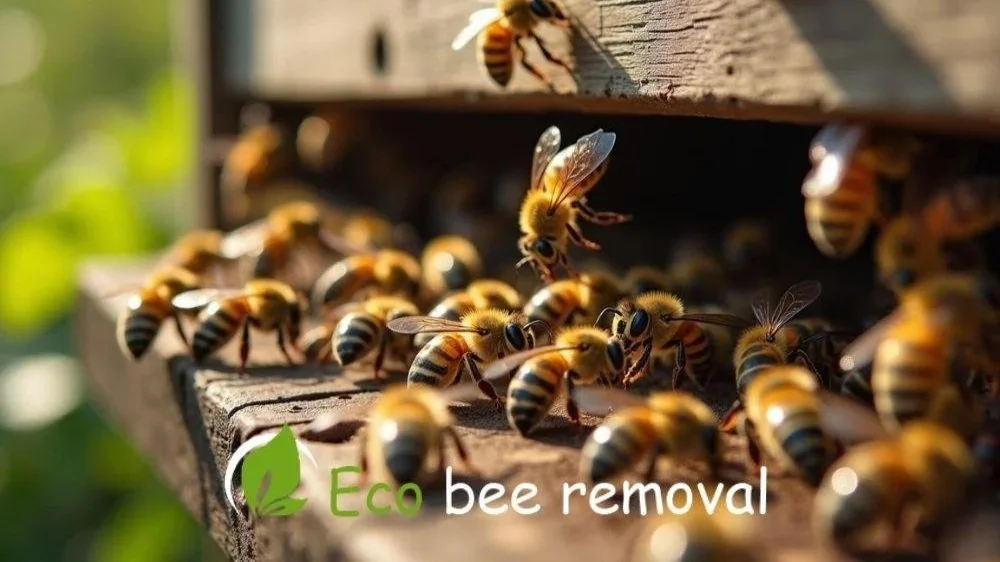How to Handle Aggressive Bees Without Harming Them
When you think of bees, you probably picture busy pollinators buzzing peacefully around flowers. However, bees can become aggressive—especially if they perceive their hive as threatened. Before reaching for insecticides or running away in panic, it’s important to remember that bees play an essential role in our environment. The goal isn’t to harm them but to manage the situation safely and responsibly.
In this guide, we’ll explain why bees become aggressive, how to stay safe, and eco-friendly ways to handle aggressive bees without hurting them or destroying their hive.
Honey bees swarming defensively around their hive entrance in Florida.
🔍 Why Bees Become Aggressive
Bees aren’t naturally hostile creatures. In most cases, aggression is a defensive reaction rather than an attack. Understanding what triggers bees can help you manage them safely.
Here are a few common reasons bees become aggressive:
1. Protecting Their Hive
Bees are extremely protective of their queen and honey. If you get too close to the hive, they may perceive you as a threat.
2. Vibrations and Noise
Lawn mowers, chainsaws, or loud machinery near a hive can alarm bees and trigger defensive behavior.
3. Strong Scents or Colors
Perfumes, deodorants, or brightly colored clothing can attract bees or make them feel threatened.
4. Weather Changes
Hot, humid, or stormy weather can make bees more irritable—similar to how humans get cranky in uncomfortable conditions.
5. Previous Disturbance
If a hive has been sprayed, poked, or disturbed before, bees may remain on high alert for days.
Signs of Aggressive Bee Behavior.
Before bees attack, they often give warning signals. Recognizing these early signs can prevent a dangerous situation:
• Increased buzzing around you
• Headbutting or bumping your skin or clothes
• Large numbers flying out of the hive suddenly
• Bees follow you when you move away
If you notice any of these signs, stay calm and slowly retreat. Quick movements can make things worse.
How to Stay Safe Around Aggressive Bees
When you encounter aggressive bees, safety should be your priority—but that doesn’t mean harming them. Follow these simple steps:
1. Stay Calm and Move Slowly
Don’t swat or wave your arms. Quick motions make bees defensive. Move away slowly and calmly until you’re at least 50–100 feet from the hive.
2. Protect Your Face and Head
Bees target faces because they sense carbon dioxide from our breath. If bees start circling you, cover your face with your shirt or hands and move indoors or to a vehicle.
3. Avoid Fragrances and Bright Colors
When spending time outdoors, opt for light-colored, smooth clothing instead of floral perfumes or lotions. Bees are less likely to react to neutral tones.
4. Don’t Use Insecticides
Spraying bees may kill them and make survivors even more aggressive. Plus, pesticides harm pollinators and can contaminate your environment. Choose eco-friendly options instead.
🌿 Eco-Friendly Ways to Handle Aggressive Bees
The best approach is humane removal and professional relocation. Here are the recommended steps:
1. Identify the Source
First, locate where the bees are coming from. Check walls, attics, chimneys, or trees for hive activity. If bees are frequently gathering in one area, they may have a nest nearby.
2. Keep a Safe Distance
Once you’ve identified the hive, stay back. Do not attempt to remove or seal it yourself. Bees inside a structure can become aggressive if they feel trapped.
3. Call a Professional Bee Removal Service
Contact a licensed live bee removal company like Eco Bee Removal. Professional technicians can:
• Safely remove the hive without using harmful chemicals
• Relocate the bees to a beekeeper’s apiary
• Repair entry points to prevent future infestations
This ensures both your safety and the bees’ survival.
4. Use Smoke (with Caution)
Beekeepers often use a small amount of smoke to calm bees during hive inspections. However, this should only be done by trained professionals. Too much smoke can harm the colony.
5. Provide an Alternative Habitat
If possible, install a bee box or artificial hive away from your home or yard. This encourages relocated bees to nest in safe, controlled areas.
Licensed bee removal expert humanely relocating a hive from a Florida home wall.
Preventing Future Aggression
Once the bees are safely relocated, take preventive measures to avoid similar situations in the future:
• Seal Cracks and Holes: Close off wall gaps, roof spaces, or vents where bees could build hives.
• Remove Sweet Odors: Clean up spilled soda, fruit, or sugary substances outdoors.
• Maintain Your Yard: Trim back overgrown shrubs and trees to reduce nesting spots.
• Install Bee Deterrents: Use natural deterrents like citronella or peppermint oil near entrances.
By keeping your home bee-proof, you can enjoy a safe environment without harming pollinators.
Why It’s Important Not to Harm Bees
Bees are vital to the ecosystem. About one-third of the food we eat relies on bee pollination—including fruits, nuts, and vegetables. Unfortunately, bee populations are declining due to pesticides, habitat loss, and climate change.
Killing aggressive bees doesn’t solve the long-term issue—it makes it worse. Relocation allows bees to continue their important work while keeping your property safe. It’s a win-win solution for both humans and nature.
Eco Bee Removal: Safe, Humane, and Effective
At Eco Bee Removal, we specialize in live bee removal across Florida. Our experienced team uses eco-friendly, chemical-free techniques to remove and relocate hives from homes, businesses, and outdoor spaces.
✅ 100% live bee relocation
✅ Licensed, insured, and trusted professionals
✅ Safe for your family, pets, and the environment
✅ Fast and affordable service
📞 Call us today at (888) 282-1886
🌎 Visit www.ecobeeremoval.com
We believe every bee deserves a second chance—and every homeowner deserves peace of mind.
Final Thoughts
Aggressive bees can be alarming, but remember—they’re not out to get you. They’re just protecting their colony. By staying calm, understanding their behavior, and choosing humane removal methods, you can handle aggressive bees safely without harming them.
Whether it’s a buzzing wall, an attic hive, or a swarm near your garden, Eco Bee Removal is here to help you take care of it the right way—protecting both your home and Florida’s bees.


